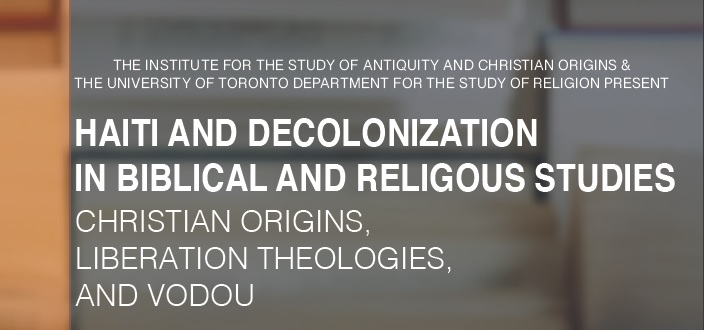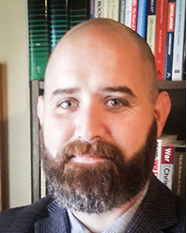
Below is a conversation between Religious Studies Ph.D. Candidate, Daniel C. Smith, and Dr. Nathan A. Leach on the upcoming conference “Haiti and Decolonization in Biblical and Religious Studies: Christian Origins, Liberation Theology, and Vodou,” taking place on 1 April, 1:00-4:00 pm CST. The conference is co-hosted by the University of Texas at Austin’s Department of Religious Studies, the Institute for the Study of Antiquity and Christian Origins (ISAC), and the University of Toronto’s Department for the Study of Religion.
Register HERE if you’d like to attend.
Daniel C. Smith:
What is this conference about?
Nathan Leach:
The conference is about decolonizing work within the fields of Biblical and Religious Studies, focusing particularly on the work of Haitian scholars, work on Haitian practices and experiences, and work on Haiti. In many ways, it is an attempt to follow as models the long-running work of scholars like Fernando Segovia and Vincent Wimbush in Biblical Studies and scholars like Linda Tuhiwai Smith within Religious Studies, all of which have emphasized the importance of previously marginalized experiences and voices to the work of decolonizing fields that have been historically Eurocentric. Within Religious Studies, indigenous scholarship/scholars broadly, and Afro-Caribbean scholars/scholarship specifically, have played and continue to play important roles in this work. Within Biblical Studies, liberation theologies, as well as wider Black and Womanist hermeneutics, have been important. My co-organizer for this event, Ronald Charles (University of Toronto), has been involved for some time in this vein of Biblical scholarship, in his independent research as well in collaboration with Segovia and others.
Daniel C. Smith:
Why Haiti in particular?
Nathan Leach:
I have personal connections to Haiti, as do most of the people involved in the conference, in different ways, but in more general terms, I would say that Haiti has a lot to offer in terms of thinking about the complex ways both colonization and decolonization operate. Its Revolution against European colonization in the late-eighteenth and early-nineteenth centuries reverberated through the world, held up as both an inspiration (for other revolutionary and decolonizing movements) and a warning (particularly among enslavers). The study of Haitian Vodou has grown significantly within Religious Studies, particularly within branches of scholarship focused on indigenous religion and decolonization. While it has received far less attention than liberation theologies in the contexts of South and Central America or the African American Civil Rights movements, Haiti has its own long-standing liberation theology tradition, and one that has also been in frequent dialogue with those who see Haitian Vodou as a decolonizing movement. Celucien Joseph, who will be joining us for this conference, has published several books on Haitian liberation theology and (along with Nixon Cleophat) its dialogue with Haitian Vodou–here again, this is much more their area of specialization than my own.
Daniel C. Smith:
What kinds of topics should we expect from the conference presenters?
Nathan Leach:
Henri Claude Télusma will be starting us off with a paper analyzing the role of music in conflict between Evangelical Christianity and Vodou in Haiti. Vodou and Haitian Pentecostalism in psychological support of the sick and how both approach pathologies and mental disabilities. Celucien Joseph will be presenting on the early liberation theology of Jean-Bertrand Aristide and how it relates to the popular violence, gansterization, and chimerization associated with his political leadership and actions during his second presidential administration. Lewis Ampidu Clorméus’s paper will chart the development and effects of 19th-century anti-vodou laws in Haiti. Elizabeth McAlister will present on the paradoxes of progressive decolonization narratives and policies within contemporary White American missionary work in Haiti. My own paper discusses the economic rhetoric of patronage and indebtedness in the Apostle Paul’s letters to Philemon and Philippians and the legacy of this rhetoric in certain modern missiological models and missionary rhetorics. Ronald Charles will provide a response to the rest of the papers presented and hopefully start some dialogue between them for the Q&A time.
Daniel C. Smith:
Can you say more about your own connection to Haiti and why you, personally, wanted to put together a conference like this?
Nathan Leach:
I grew up in Haiti, in a missionary family. The mission’s work focused primarily on medical services, food distribution (working with USAID, CARE, and CAM), building rain-water cisterns, and running an elderly widows’ home. Growing up I saw that work in terms of humanitarianism and philanthropy–I did not see how they also entailed paternalistic relationships of patronage and colonization. I grew up seeing Haiti primarily as a place (and Haitians as a people) in need (of “Western”/“Eurocentric” aid, in a variety of ways, though I wouldn’t have phrased what I thought in quite those terms), but I never really thought about the systemic conditions that continually (re)produced that need or whose interests it served (economically and ideologically). I didn’t see how that essentialized framing narrative of neediness and magnanimous provision (re)produced harmful power disparities, obscured deeper dynamics of exploitation/extraction, and devalued/elided the contributions of Haiti/Haitians. The privileged and privileging perspective I grew up with is one that I am still trying to not just own and deconstruct within myself, but one I feel responsible to own and join in dismantling around me, particularly with respect to Haiti (given my personal connection to it). So, for me, this conference reflects an ongoing process of learning (and unlearning) that I think I have a responsibility to engage in, that I think the fields (and country) I work in need to do more of, and that I know other scholars (including those involved in this conference) have already been about for quite some time. I want to center this work on the perspectives that have influenced this shift for me and that clearly brings a tremendous amount to this wider project, which is what this conference attempts to do.
Daniel C. Smith is a Ph.D. candidate in Ancient Mediterranean Religion writing on John’s Apocalypse and the religion of Roman Western Asia Minor.

Nathan Leach is a Shive Research Fellow in the Institute for the Study of Antiquity and Christian Origins at UT Austin. He writes on divination and prophecy in the Roman Empire.
